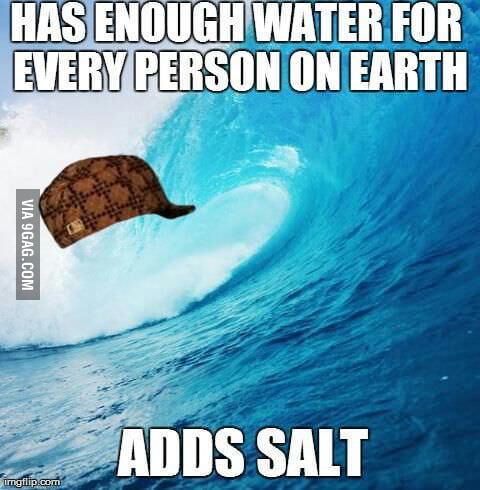
Adds Salt Meme
Desalination is the process by which a water source has salt extracted from it to create a viable freshwater source for consumption. According to this week’s lesson, there are approximately 20,000 desalination plants all over the world serving 150 countries and 3 million people. While desalinization sounds like the savior to humanity’s shrinking availability of freshwater, the process actually has effects which are actually negative in terms of ecological footprint. Desalinating any amount of water requires an incredibly high amount of energy, has impacts on local environments near the plants, and is quite expensive.
Learning that last bit has had a profound effect on my view that desalinization is the answer for providing usable water for humans. My high school biology teacher (I know. I know. I’m bringing up high school… again! But I learned a lot there so bear with me) once quoted President John Kennedy as saying:
If we could produce fresh water from salt water at a low cost, that would indeed be a great service to humanity, and would dwarf any other scientific accomplishment.
That stuck with me. I couldn’t tell you if we were studying the oceans at the time or what the ensuing lesson was about. For whatever reason, that quote stuck with me. It actually influenced me into getting involved with Charity: Water for a little while. Charity: Water is a nonprofit organization helping to bring safe drinking water to various communities around the world.
Another reason I’d hoped desalination would become a bigger industry is that I’m an avid outdoors recreationalist. I’m often hiking and backpacking in wondrous mountain areas where water is scarce. So I’m used to preserving, and sometimes rationing, my precious stock of water in my pack. I’m also a regular boater. Sure being on a boat means I’m surrounded by vasts amount of water while in the seas and on rivers, but none of that water is suitable for drinking. Should something ever happen to my boat, and I’m stranded at sea in a raft for a number of days until a rescue response team locates the raft, I’d be hard pressed for drinkable water since humans have not evolved (yet!) to a point where they can consume salty water. I’ve seen Bear Grylls or some other type of survivalist show do an episode of how to desalinate the ocean water with the supplies they’ve managed to pack into a rescue raft, and I own a nice water filtration kit for my longer hikes. The catch with that filtration kit is that it doesn’t desalinate water, so you still have to navigate to a freshwater source in the back country. Being next to an ocean and being thirsty, the filtration kit wouldn’t help very much.
 Basically, I’ve thought about desalination quite a bit. I’ve thought about it optimistically, and had a positive image of the process in my mind. Not only would desalination help me in my outdoors past times, but it would also be a great benefit to humanity (i.e. helping out all those people without safe drinking water) if we could figure out how to do it with minimal negative impacts. Until this lesson, I hadn’t given much though to the consequences.
Basically, I’ve thought about desalination quite a bit. I’ve thought about it optimistically, and had a positive image of the process in my mind. Not only would desalination help me in my outdoors past times, but it would also be a great benefit to humanity (i.e. helping out all those people without safe drinking water) if we could figure out how to do it with minimal negative impacts. Until this lesson, I hadn’t given much though to the consequences.
As a major ocean lover who heavily considered going into marine biology, I failed to realize that “widespread desalinization could take a heavy toll on ocean biodiversity.” I hadn’t thought about how it would take massive amounts of fossil fuels and energy to create the many parts needed for a desalination plant as well as to power it. In turn, this would contribute to climate change and slow sustainable living progress. That’s not what I want to happen!
I’m still hopeful about desalination. But in a more cautious way. I’m more hopeful for the  advances on the way. I’m hopeful that technological advances will help make the desalination process a better solution to the shrinking availability of freshwater problem. That these advances minimize negative impacts on the marine biosphere, are more energy efficient, and cost effective are key factors as to whether or not I think humans should continue to utilize desalination in an effort to find more viable water. Otherwise, desalination just becomes another way in which we destroy the natural planet.
advances on the way. I’m hopeful that technological advances will help make the desalination process a better solution to the shrinking availability of freshwater problem. That these advances minimize negative impacts on the marine biosphere, are more energy efficient, and cost effective are key factors as to whether or not I think humans should continue to utilize desalination in an effort to find more viable water. Otherwise, desalination just becomes another way in which we destroy the natural planet.
Leave a Reply